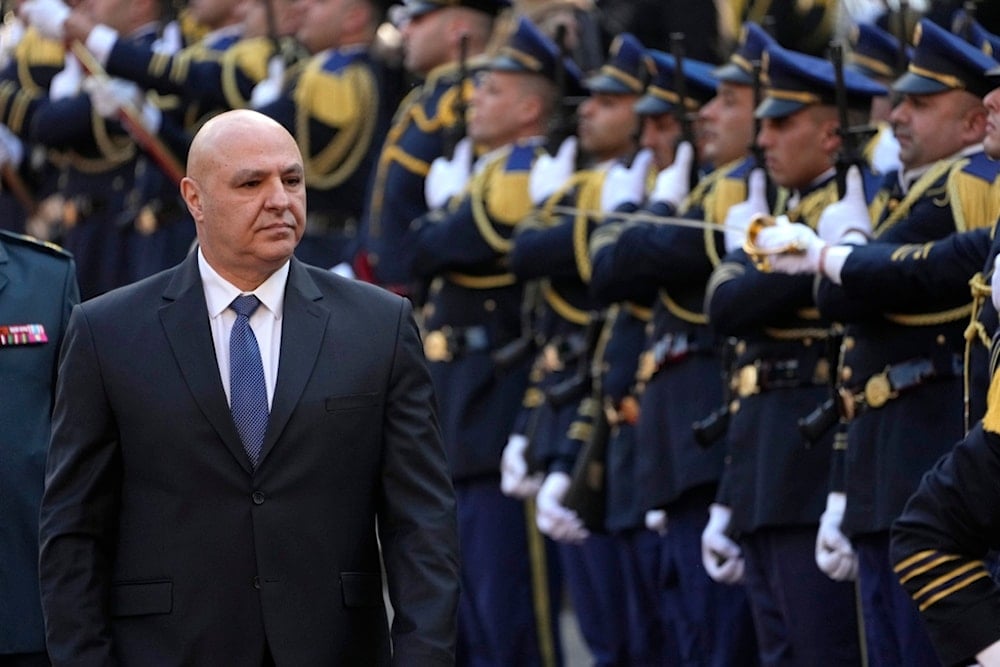US, UN praise election of Aoun as Lebanon's president
Numerous international parties praised the election of Joseph Aoun as Lebanon's 14th president following a vacancy that lasted over two years.
-

Newly-elected Lebanese President Joseph Aoun reviews the honor guard upon his arrival at the Lebanese Parliament to be sworn in as a new president, in Beirut, Lebanon, Thursday, January 9, 2025. (AP)
US President Joe Biden welcomed the election of Lebanon's army chief, Joseph Aoun, as the country’s new president on Thursday, calling him the "right leader" for the war-stricken nation.
"President Aoun has my confidence. I believe strongly he is the right leader for this time," Biden said in a statement, emphasizing that Aoun's leadership would be crucial in managing an "Israel"-Hezbollah ceasefire.
The election of Aoun, 61, ends over two years of presidential vacancy in Lebanon, a development widely praised by international stakeholders.
Turkiye 'optimistic'
Turkiye congratulated Aoun on his election, expressing hopes that his presidency would contribute to Lebanon’s stability and regional peace.
"We hope the new government in Beirut will bring about the peace and prosperity of the region," Turkiye's Foreign Ministry stated.
UN praises Aoun election
The United Nations Security Council welcomed Aoun's election, stressing the importance of functional state institutions to tackle Lebanon’s political, economic, and security challenges.
Council members emphasized the need for "fully functional state institutions, to address the pressing political, economic and security challenges" in Lebanon, according to a statement read to reporters by Algerian ambassador Amar Bendjama, whose country currently holds the body's rotating presidency.
"This is a critical step towards overcoming Lebanon's political and institutional impasse after over two years of presidential vacuum," said UN Secretary-General Antonio Guterres' spokesperson Stephane Dujarric, urging the swift formation of a government capable of addressing the Lebanese people's needs. "We encourage a swift formation of a new government to provide Lebanese people with the functioning state institutions that address their needs and address their aspirations."
Aoun faces immediate and significant challenges, including overseeing a ceasefire in southern Lebanon and appointing a prime minister to implement reforms required by international creditors. These reforms are essential for securing financial aid to alleviate Lebanon’s crippling economic crisis.
Aoun elected president
Lebanese legislators on Thursday voted for Aoun after they failed to secure the necessary two-thirds majority (86 votes) in the first round of voting earlier in the day, which is required for Aoun, as the army chief, to win.
After 71 deputies voted for the army commander in the first round, he won in the second round, with 99 recorded votes.
It is worth noting that all 128 Lebanese representatives participated in the presidential election, with ambassadors from several countries in attendance, including those of the United States, Saudi Arabia, Iran, Qatar, Egypt, and China.
Who is the 14th president of the Lebanese Republic?
Joseph Aoun has served as the Commander of the Lebanese Army since March 8, 2017, succeeding General Jean Kahwaji. His military career began in 1983, marking the start of his long service in the army.
He was promoted to Brigadier General in 2013 and continued to rise through the ranks, achieving the rank of General in 2017. That same year, he was appointed Commander of the Army, leading during one of the most sensitive periods in Lebanon's history.
Lebanon faced significant security and political challenges during this period, including the notable "Dawn of the Outskirts" battle in 2017. In this operation, the Lebanese Army, in cooperation with Resistance forces, fought against terrorist organizations on the outskirts of the towns of Arsal and al-Qaa, located on the Syrian border.
The country also faced significant security challenges following the outbreak of protests on October 17, 2019, and the prolonged Israeli war on Lebanon in 2023, which lasted over 60 days. These events placed new responsibilities on the Lebanese Army, particularly with the signing of the ceasefire agreement.
Read next: An overview of Lebanon's presidential election process

 4 Min Read
4 Min Read








